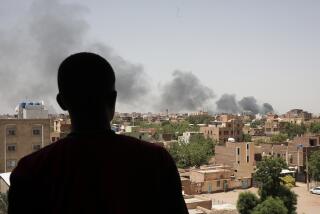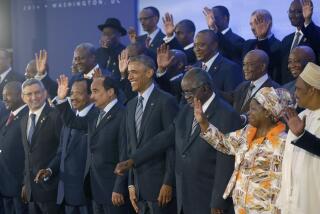Bush’s Safety in Somalia Is Marines’ Job 1 : Africa: Most troops will be diverted to security as President meets GIs, sees orphanage and feeding center in two-day visit.
- Share via
MOGADISHU, Somalia — The main U.S. Marine mission of opening and securing food distribution centers for millions of starving Somalis will be preempted for the next two days by a more immediate calling: protecting President Bush.
For 41 hours starting today, Bush will stop for photo opportunities and ad-libbed remarks to Somali orphans and to the American troops stationed here at his orders. “The President won’t be making any substantive or significant speeches,” said a member of his staff.
That Bush does not plan to undertake matters of substance here was underscored by the departure of Robert B. Oakley, the special U.S. envoy to this embattled nation, who went off for a 10-day leave.
What the President will do in Somalia is to meet for lunch with senior Marine officers and visit a feeding center and an orphanage. He will eat field rations, sleep aboard a Navy ship and give pep talks to the troops.
To ensure that his visit is a safe one, most of the 11,000 American combat troops here will be diverted to security, setting up roadblocks, confiscating weapons and generally keeping the President from the sight of most Somalis.
The concern is real. Despite constant patrols, several firefights and a massive presence in the capital, Mogadishu remains an armed camp with warring clans and thugs having at each other.
“I don’t think any American President ever visited a country in such a dangerous and chaotic state,” said Marine Col. Fred Peck, spokesman for the American military force here.
The fear is so great that the Marines are doing, or at least are trying to do, what policy-makers have said they would not: They are trying to disarm Somalis, even if they do not pose an open threat.
Roadblocks went up all over the city Wednesday with Marines searching cars and mule carts for weapons. In at least one incident, the troops went on a house-to-house search for arms. They confiscated any they found, even knives.
To make him as small and distant a target as possible, the President is flying here from Saudi Arabia in an Air Force C-141 cargo jet, instead of Air Force One. The huge Boeing 747 would be too vulnerable, one Marine officer said.
American forces also occupied two high-rise buildings used by snipers to fire down into the nearby U.S. Embassy, where Bush is to meet with Marine Lt. Gen. Robert B. Johnston, commander of the Somalia mission. That was a wise move. In the high-rises, the Marines found a large cache of arms, including mortars, assault rifles, ammunition and recoilless rifles.
Peck’s assessment of the lawlessness in Mogadishu also was proved Wednesday as the shooting continued and both children and adults still walked the side streets with AK-47 assault rifles slung over their shoulders.
After his midday arrival, Bush and eight accompanying aides will fly by helicopter to an out-of-town feeding center. On Friday, he will visit an orphanage in western Somalia. The children have been learning songs in English to sing to “the very important person” they have been told will visit.
The President will spend two nights aboard the Tripoli, an assault ship anchored several miles offshore. Reporters were told that there will be no New Year’s Eve festivities.
Besides his New Year’s Day trip to the orphanage, Bush will travel by helicopter to another city to lunch with Marines. He will dine on MREs, the “meals ready to eat” that American troops around the globe have learned to deride.
Then Bush will head back to Mogadishu, where he will address about 2,000 troops gathered on the airport tarmac. He returns to the Tripoli for the night before leaving Saturday morning for the Black Sea resort of Sochi and a summit with Russian President Boris N. Yeltsin.
Despite the presidential diversion, some aspects of what has become normalcy here continued Wednesday. A food convoy escorted by 400 American and Italian troops left for the port city of Marka, one of the last potentially hostile cities in the country.
Muslim fundamentalists who vigorously oppose the American presence are strong in Marka, as are gunmen who have forcibly prevented relief shipments from being unloaded unless they receive huge bribes.
Bush’s visit is sort of a watershed, coming at the end of the first stage of the American mission--establishing security for food distribution--and before the transition to a U.N.-sponsored international peacekeeping force.
The next important step for the Somalia mission will come Monday in Addis Ababa, Ethiopia, where leaders of the 12 main Somali clans have been invited for a conference. Officially, the session will prepare an agenda for a full-blown peace conference later in Mogadishu, where diplomats hope a final peace agreement will be reached, ending this country’s two-year civil war.
The two days in Addis Ababa are key to any real political reconciliation. “If they can’t agree, then we’re lost,” a U.N. official said.
So far, nine of the 12 clans have agreed to send representatives to Ethiopia, including the major warring factions led by Gen. Mohammed Farah Aidid and the self-proclaimed interim president, Ali Mahdi Mohamed. The remaining three clans are expected to respond by the weekend, said U.N. spokesman Farouk Mawlawi.
Beyond the details of when and where the full conference will be conducted, he said, “we hope some sort of Somali entity could be identified with which contact can be established,” meaning the United Nations wants the meeting to name an interim council to begin performing the functions of a government in this anarchic land.
The Addis Ababa meeting is important enough to draw U.N. Secretary General Boutros Boutros-Ghali, as well as observers from the Organization of African Unity, the Arab League, the Nonaligned Movement and other key regional organizations.
If all goes well, the full peace conference will be conducted within two or three months, Mawlawi said. That is essentially the time frame for the United States to withdraw all but logistic and supply units.
More to Read
Sign up for Essential California
The most important California stories and recommendations in your inbox every morning.
You may occasionally receive promotional content from the Los Angeles Times.













